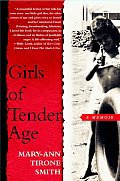
Girls of Tender Age: A Memoir
by Mary-ann Tirone Smith
Little Girl Lost
A Review by Reeve Lindbergh
Mary-Ann Tirone Smith, the author of eight novels, has written a memoir that is at once entertaining and troubling. She alternates her own experiences as a child growing up in 1950s Hartford, Conn., with chapters on Robert Nelson Malm, who was tried and executed for the rape and murder of one of her fifth-grade classmates.
The memoir chapters are matter-of-fact, often very funny and warmly intimate. But the Malm narrative is impersonal, a stark and detailed recitation of fact. To go from one style to the other can be disconcerting, but constructing a divided narrative may have been the only way the writer could bring herself to tell this tale. Smith grew up in a socioeconomic class described by her father as "Working Stiffs." She had French and Italian immigrant grandparents and was raised in what today surely would be called a dysfunctional nuclear family, though in the 1950s such terms did not exist. When the author's mother yanked on her daughter's arm so hard that the humerus broke, there was no talk of abuse, just the whispered comment, "Florence is on the verge of a nervous breakdown ."
Her gentle father worked at a ball-bearing factory and dedicated his life to the care of his son, Smith's brother Tyler, who was labeled retarded or crazy throughout his youth, despite a phenomenal memory for World War II military history. (Years later, Smith learned that Tyler was an autistic savant.) The family members went "half-mad" accommodating his aversion to noise. No school friends were permitted to visit the home, and everyone in the family refrained from laughing, crying or even responding to pain out loud.
Most children take their family circumstances for granted, whatever those circumstances are: in this case, a brother who bites his wrist bloody if he hears loud sounds, a mother who was fired from her first job because she got married, a grandmother who died having her 12th baby because the priest said birth control was "a filthy, disgusting practice and a mortal sin besides." All of these difficulties can be folded into a child's accepted version of normal family life, at least until she comes of age and learns otherwise.
Murder is different, especially the murder of a shy 11-year-old friend, who shared her jump rope in the school yard and ate leftover golabkis for breakfast. The brutal killing of Irene Fiederowicz crashed through the author's neighborhood and childhood like a brick through a window, leaving shattered lives and silence.
"GIRL, 11, STRANGLED WITH HER OWN SCARF," screamed the headlines in the Hartford Times on the day the crime was discovered, but Smith's fifth-grade teacher instructed her class, "There will be no speaking of Irene." Talk was forbidden, newspapers were kept from children, the victim's desk was removed from its row in the classroom, and the other desks were rearranged, as if Irene had never existed at all.
"Irene was killed twice," Smith writes, "murdered by a horrific man, and then erased by the era that was the fifties -- all who needed to talk about her silenced." As an adult -- first in a psychology class in college, then in an article for the Hartford Courant, now in this memoir -- Smith has resurrected the crime that seared her childhood, and Irene has emerged again. The author exposes every fact in obsessive detail, from the square knot used to secure Irene's scarf around her neck to the graphic eyewitness accounts of Malm's death by electrocution.
Smith claims that in writing this book she hoped to "build a memorial to Irene." In fact, she has built a memorial to her brother, to her childhood and to the truth. With intelligence, disarming humor and deep affection for the families and the neighborhoods of the 1950s, Girls of Tender Age speaks eloquently on behalf of children and confronts the crippling silences that damage us in any era.

No comments:
Post a Comment